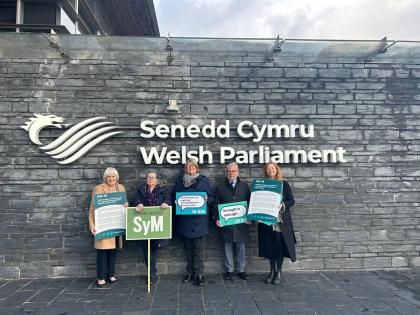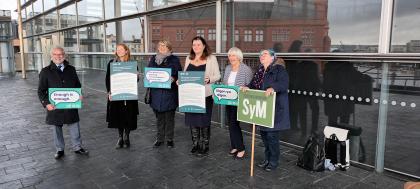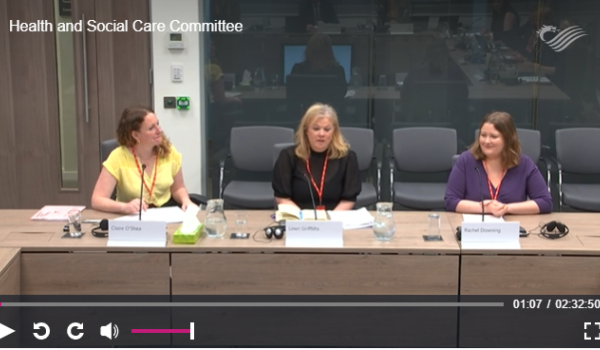Wales has some of the worst survival rates for ovarian cancer in Europe. Over 300 women are diagnosed with ovarian cancer each year in Wales and more women die as a result of ovarian cancer in the UK than all other gynaecological cancers combined.
This is not acceptable.
That’s why earlier this year, on behalf of all women affected by ovarian cancer, we gave evidence to the Health and Social Care Committee as they undertook an inquiry into gynaecological cancers. We urged them to focus on addressing the barriers to improving early diagnosis by increasing symptoms awareness, improving GP knowledge, addressing variation in treatment and making changes to data availability and support.
Last week, the report from that inquiry was published. It’s key finding was that women are often overlooked and their experiences minimised. Below we detail the recommendations we made to the committee and what has been taken forward.

Our recommendations to the committee
Our Pathfinder Wales research found that women diagnosed with ovarian cancer in Wales do not feel heard. This is unacceptable. Combined with a lack of symptoms awareness, too many late stage diagnoses, little investment in the workforce and not enough emotional support for women available, it is clear not enough progress is being made. These areas must be urgently addressed to ensure women are receiving the diagnosis, treatment and support they deserve.
During the inquiry into gynaecological cancers in Wales, we gave evidence to the Health and Social Care Select Committee on the barriers women are facing and what action needs to be taken to break these down. We recommended that the government:
-
Took immediate action on diagnosis
-
Ensured fairer access to treatment
-
Provided specific data on ovarian cancer
-
Improved the provision of support
Target Ovarian Cancer welcome the Committee's recommendations to the Senedd to focus on gynaecological cancers. We are pleased that many of our recommendations have been published in the report. Women have told us that they don’t feel heard, and that they have been failed. This needs to change. Until it does, we will continue to provide the evidence needed to increase focus on ovarian cancer.
What recommendations have been published in the report?
We're pleased to see many of our recommendations published in the report. There has been a notable focus on symptoms awareness, diagnosis and treatment which is encouraging:
Action on diagnosis – amplifying symptoms:
Symptoms awareness is vital to early diagnosis and we are pleased to see a number of recommendations relating to this:
-
The committee have recommended a series of campaigns to raise awareness about the symptoms of gynaecological cancers which would be run frequently and prompt women to seek medical advice if they experience symptoms. With just 27% of women able to recognise bloating as a symptom in Wales, we are encouraged to hear this recommendation. Target Ovarian Cancer want to see urgent action taken on low symptom awareness in Wales, and handed a petition to the Health Minister in November calling for ovarian cancer symptoms to be included in regular symptom awareness campaigns.
-
In addition to symptom awareness campaigns, the report supported our recommendation to provide information at cervical screening appointments to make it clear that these screenings do not detect ovarian cancer. This is a positive step forward. Currently, 42% of women in Wales wrongly believe a cervical screening can detect ovarian cancer. Providing this vital information at this appointment could increase knowledge and awareness that cervical screenings do not detect ovarian cancer.
Action of diagnosis – support and education for primary care:
Our research showed that 43% of GPs wrongly believe symptoms only present in late stages. It is vital that GPs are aware of the key symptoms of ovarian cancer and know how to advise patients who have concerns.
GP education is paramount to early diagnosis and this is why we must ensure GPs are supported with access to training and education resources. Target Ovarian Cancer have developed education modules to improve GP knowledge on ovarian cancer and recognise the symptoms, but we urged the committee to focus on this area to improve women’s experiences.
-
We welcome the focus the committee has placed on the importance of GP education and the need for GPs to keep abreast of the latest guidelines and diagnostic techniques. We were pleased to see the committee also reference our Pathfinder Wales research in this report and acknowledge that too many women continue to be misdiagnosed.
Fairer access to treatment
Everyone must be able to access the treatment they need, no matter where they live, and women must be informed of available clinical trials.
-
We welcome the report recognising the challenges facing many women accessing treatment in Wales and the commitment to addressing this to ensure everyone can access treatment as soon as possible. Following our Pathfinder Wales research which showed there was a 10% decline in women being asked to take part in clinical trials, the committee recommended that opportunities are shared with women so that they can make informed choices.
-
Specific data
To understand the landscape of ovarian cancer and its impact on women in Wales we must see specific data on this type of cancer.
-
The committee has recommended a review of incidence and trends in conjunction with the Wales Cancer Network, another welcome step.
Increased support
An ovarian cancer diagnosis is devastating. Women need to be heard and supported from the moment of diagnosis, throughout treatment, and after treatment.
-
The committee have recommended that the government writes to all health boards to remind them of their duty to ensure women are treated with dignity and respect
In summary
The report published is encouraging, and we're pleased to see a number of our recommendations taken forward. While the report is encouraging, we hoped for more recommendations to be made regarding disaggregated data on ovarian cancer and increasing support for the workforce and individuals.
We will continue to work with the Health Select Committee and the Welsh government to ensure the experiences of women with ovarian cancer are heard, improved and that they are never ignored.




